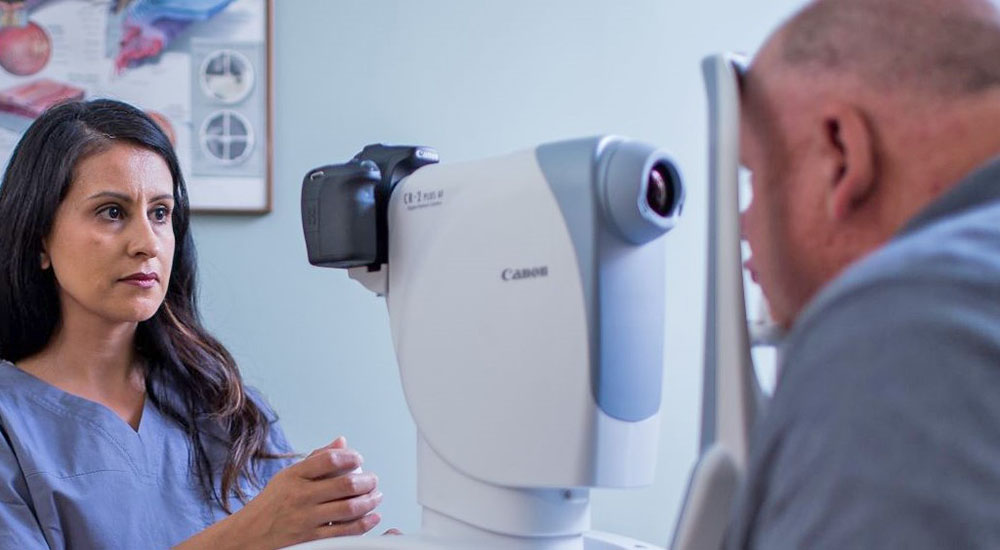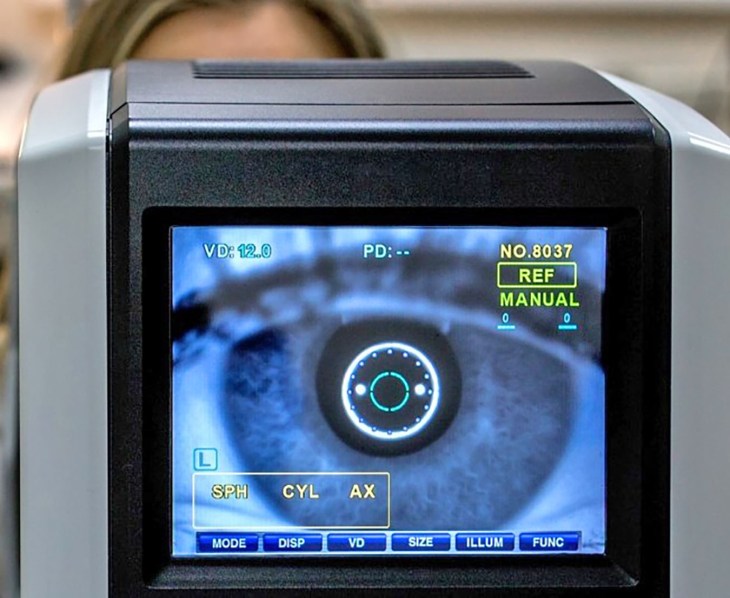More than 40 years ago, Navy Veteran Ronald Alvin Beck was in a motor vehicle accident. The crash left him with no vision in his left eye and scarring in his right eye.
For years, Beck used high-powered prescription eyeglasses to help him see. But he has recently struggled more with his vision.
“I had a hard time reading, [and] seeing the TV. I had to get real close up. In the sunshine, I couldn’t see at all with my glasses,” Beck said.
Last fall, Beck went to the Carl Vinson VA in Dublin, Georgia, for an eye care appointment. The referral he got that day would turn out to be life-changing. It was Dr. Daniel Brigham, supervisory optometrist, who decided that Beck was an ideal candidate for the new Technology-based Eye Care Services (TECS) low vision pilot program.
What Is TECS?
TECS is one of three national ocular telehealth programs supported by the VA Office of Connected Care. It aims to improve access to eye care services in rural areas where there are shortages of specialists. TECS provides a range of remote services including prescription glasses for Veterans, screening for glaucoma, diabetic retinopathy, macular degeneration and cataracts.
Another VA connected care eye telehealth program is Tele-low-vision. In multiple sites across the country, these two programs have collaborated to improve the lives of Veterans. The TECS-low vision initiative that Beck was referred to helps Veterans whose visual impairment cannot be fully corrected with glasses, surgery or medications.
“Low vision can be a huge burden,” said Brigham. “You may not be able to navigate your environment very well and reading is a big complaint for patients with low vision.”
The TECS-low vision pilot program matches Veterans with many types of vision aids. During a TECS low vision appointment, Veterans visit their local VA facility and meet with a Clinical Resource Hub eye care specialist over video telehealth.
“Some of the stuff they have now is amazing.”
In his case, Beck went to Dublin VA and a telehealth technician connected him with Dr. Alex Keith, a low-vision trained optometrist. Keith also supports TECS-low vision appointments at the Tifton VA Clinic and the Brunswick VA in Georgia.
“I’m the remote provider, but the technician is there assisting the patient, showing them the devices and walking them through a demonstration when I’m explaining how to use something. They play a huge role and we greatly appreciate them,” Keith said.
Before an appointment, Veterans have a comprehensive eye exam and Keith reviews the records to help inform the visit.
“We take a lot of time talking to the patient about where they’re having the most difficulties during the day and then coming up with ways to help them through magnification devices and technologies. You don’t even realize the impact of just being able to read your mail rather than needing your spouse to read it for you, the independence that gives you. Working in VA is great because I can provide patients what they need,” he added.
To assist Beck, Keith recommended near-vision reading glasses as well as amber tints for outdoors to shield the sun and eliminate glare. Beck also received handheld magnifiers, a magnifying lamp, and even a talking clock so he no longer needs to reach for his glasses at night to know what time it is.
“The glasses helped me 100%. Now I can read books and everything. I don’t have to get right on top of it to see. I would definitely recommend this program. Some of the stuff they have now, it’s just amazing,” Beck said.
To learn more about VA TeleEye programs, visit the VA Telehealth website.
Topics in this story
More Stories
Veteran Byron Potier weighed almost 300 pounds and was tired and lethargic. He was the perfect candidate for gastric sleeve surgery.
How much do you know about VA care, benefits and services? Don’t miss out on what you've earned—check out the "2025 VA Federal Benefits Guide for Veterans, Dependents, Survivors, and Caregivers" handbook to learn more.
Feeling stressed? Your breath can help you relax and focus. Take 3 minutes to reset and prioritize your well being for this week's #LiveWholeHealth practice.








sounds like they are trying to replace the BRC’s with a phone call